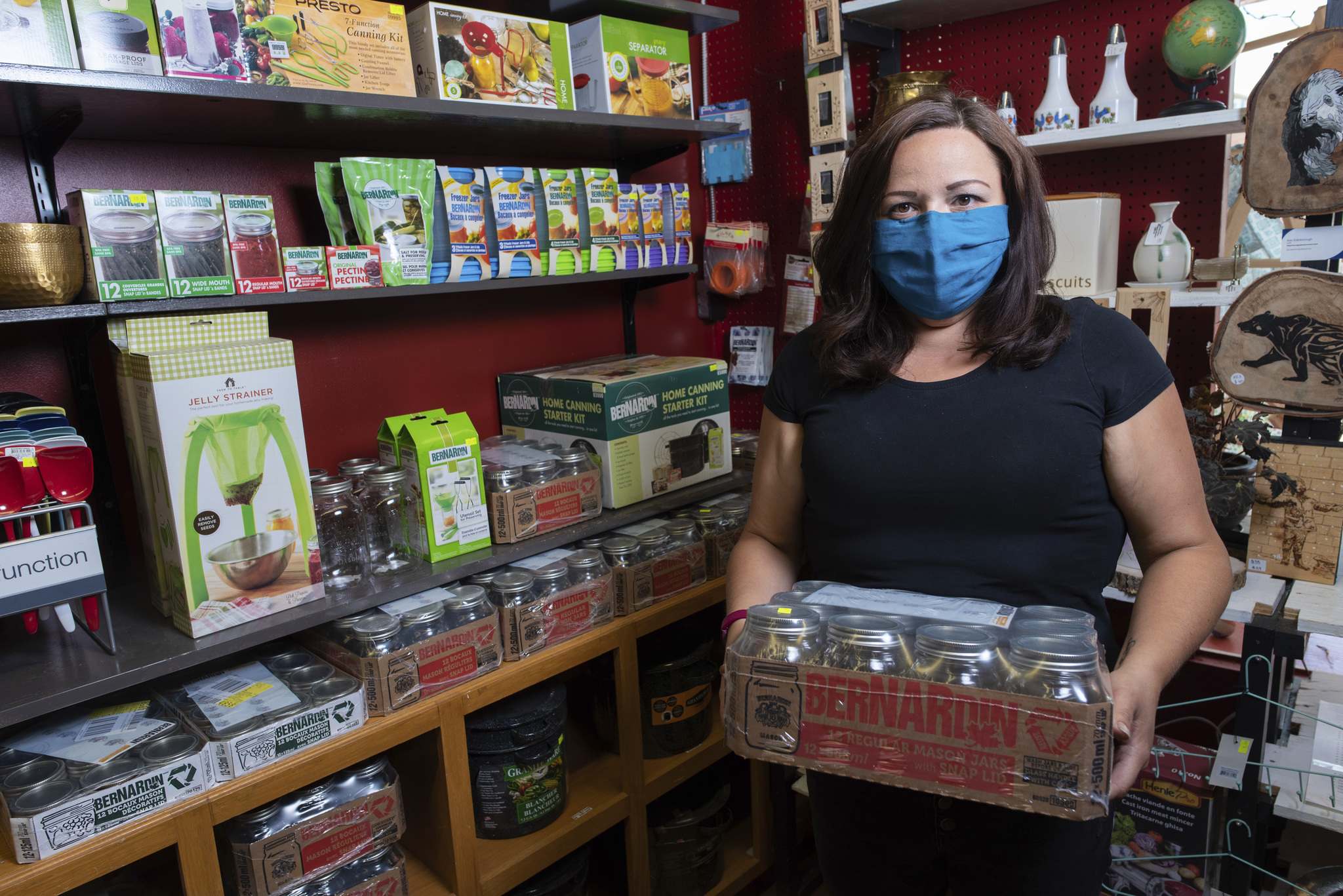Can-do attitude
Manitobans take up mission of self-preservation during pressure-filled pandemic
By: Eva Wasney | Posted: 09/1/2020 7:00 PM | Last Modified: 09/3/2020 1:14 PM | Updates
A pressure canner was Byanka Holder’s first pandemic purchase when the coronavirus made local headlines back in March.
The 32-year-old mother of three had tried canning a few times in the past, but widespread panic-buying and food-insecurity fears prompted her to turn the hobby into a form of self-preservation.
"Flour ran out quickly, sugar, yeast and there was a couple of times where I couldn’t even find milk," says Holder, who lives in Ste. Anne. "(That) put in perspective how much we get our food shipped in, so we wanted to see how much we can grow and store away."
She started growing her own fruits and vegetables last year on a plot next to her husband’s workplace and has doubled the size of the garden to support her canning endeavour. Holder has been preserving steadily throughout the summer, turning ripe produce into food for the winter and beyond.
"Knowing that I will have meals that we can rely on, in case of even a power outage … makes me feel really good and like I can provide something for my family," she says.
Using a pressure canner, as opposed to a water bath canner, allows Holder to save full meals and meat dishes thanks to the device’s high processing temperature. Traditional water bath canning requires foods high in acidity, such as pickles and fruit jams, to stave off harmful bacteria.
While the process has quelled some of her pandemic-related food anxieties, finding space for the stockpile has been a challenge. Without a proper pantry, Holder has turned her spare bedroom into storage space and filled every other nook and cranny.
"I’m pretty much stuffing my house with jars," she says, laughing.
Holder isn’t the only Manitoban trying her hand at food preservation for the first time this year. While looking for canning resources online, she stumbled on a Facebook group of like-minded locals called What to do With What You Grew, in Manitoba!
Longtime canning enthusiast Vicky Devillez started the group last September to teach others how to preserve safely and properly. Since the beginning of the pandemic she’s watched the membership fill with novice gardeners looking to make the most of their harvest.
"People were posting things (asking), ‘Vicky, in September, if I want to can this, what should I grow and what do I need to buy?’ And since then, it’s kind of taken off," she says. "It’s been really interesting to watch the interest from people who never thought they would can."
Devillez grew up helping her mother clean and prepare vegetables from the family garden for preservation. During her career as a teacher, she spent summers tending her own garden and making pickles, zucchini relish, tomato salsa and pepper jelly to sell to friends and family. The process of peeling, chopping and filling jars has become something of an addiction.
"Part of me kind of enjoys that as much as I enjoy the eating," Devillez says. "It’s relaxing, it’s rewarding, there’s money to be saved (and) the food you make is way better than anything you could buy."
Despite its virtues, home food preservation can have some serious pitfalls. Botulism, an illness that can cause paralysis and even death, can be contracted from foods that have been improperly processed for canning.
For this reason, Devillez is adamant about sharing reputable information and tested recipes — like those created by jar-makers Ball (freshpreserving.com) or Bernardin (bernardin.ca) — on her Facebook page. She sees the group as an opportunity to educate newbies and entice longtime canners to step away from unsafe, old-school methods, such as sealing jars with paraffin wax.
"There’s so many crazy methods," Devillez says. "Canning has evolved in the last 30 years."
Snehil Dua is a food and human nutritional sciences instructor at the University of Manitoba. She teaches courses on food safety, preparation and preservation and has seen some questionable practices over her career.
"I’ve heard people are using microwaves and ovens to can," Dua says. "Those are dangerous methods because it will never reach the temperature to even kill vegetative cells (of bacteria)."
The bacteria spores that cause botulism exist in soil and can survive in high temperatures and germinate without oxygen. The best way to avoid bacterial growth is to follow recipes exactly and use the recommended equipment, says Dua.
"If a trusted recipe is saying that you must pressure can for this long, in this size of container, that’s exactly how we should be doing it," she says. "You are taking chances if you’re modifying those recipes."
She recommends the National Center for Home Food Preservation (nchfp.uga.edu) in the United States as a source for research-based recipes and canning methods.
While glass jars and rings can be reused, new metal lids are needed for every canning batch to ensure a proper seal.
Fruits and vegetables prepared with at least 65 per cent sugar or added edible acids such as vinegar are suitable for water-bath canning, since sugar acts as a preservative and bacteria won’t germinate in an acidic environment with a pH level lower than 4.6.
Tomatoes are a borderline case, since different varieties have different acidity.
"Typically you would add some citric acid or something to make them more acidic, or test the pH," says Dua. "I personally would pressure can tomatoes."
The university instructor isn’t surprised to see growing interest in food preservation amid the COVID-19 pandemic.
"Every time there is an economic change… people turn more towards canning and preserving food and gardening," Dua says, adding that she believes the practice has benefits beyond saving money.
"I think there’s a happiness factor related to the interaction with our food and if you’re growing your food, that’s the best interaction you can have."

JESSE BOILY / WINNIPEG FREE PRESS
Samantha Leclerc, general manager at Pollock’s Hardware, says she has seen an increase in sales for gardening seeds and now the same people are looking for canning supplies for their gardens.
Winnipeg retailer Pollock’s Hardware Co-op has noticed an uptick in customers shopping for canning supplies in the last few weeks.
"Canning supplies are always a hot item," says general manager Samantha Leclerc. "This year, however, we have definitely noticed an increase in people looking for supplies… who are new to canning."
Pollock’s sells the bulk of its canning items — from mason jars to racks to pickling salt — in August and September. This spring, the store saw higher demand for garden seeds and Leclerc believes the trends go hand-in-hand.
"There were more people planting gardens in the spring than we’ve seen before and now people are preserving those vegetables," she says.
"I also think, since the pandemic started, people have more time at home and people would rather grow their food than be out at the store.
"There’s just a renewed interest in being self reliant."



